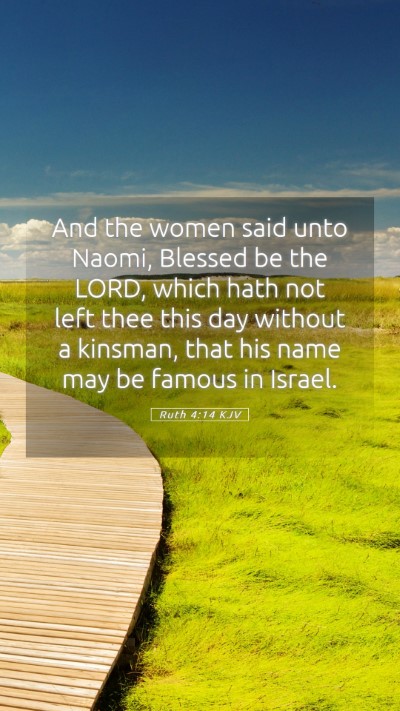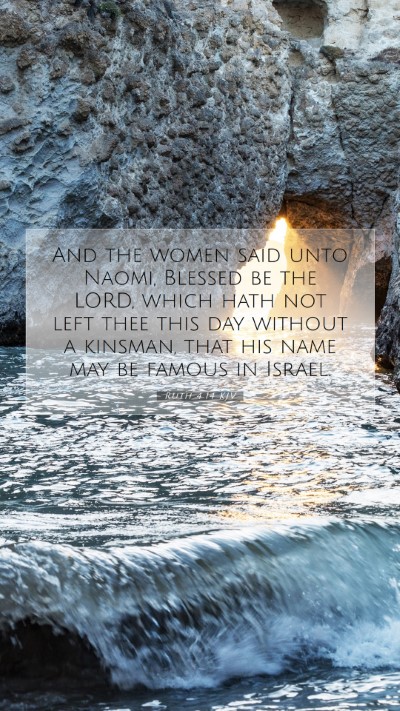Old Testament
Genesis Exodus Leviticus Numbers Deuteronomy Joshua Judges Ruth 1 Samuel 2 Samuel 1 Kings 2 Kings 1 Chronicles 2 Chronicles Ezra Nehemiah Esther Job Psalms Proverbs Ecclesiastes Song of Solomon Isaiah Jeremiah Lamentations Ezekiel Daniel Hosea Joel Amos Obadiah Jonah Micah Nahum Habakkuk Zephaniah Haggai Zechariah MalachiRuth 4:14 Meaning
What is the meaning of Ruth 4:14?
And the women said unto Naomi, Blessed be the LORD, which hath not left thee this day without a kinsman, that his name may be famous in Israel.
Ruth 4:14 Bible Verse Meaning
Bible Verse: Ruth 4:14
Meaning and Interpretation:
The verse Ruth 4:14 celebrates the redemption and restoration of Naomi and Ruth through the actions of Boaz. This moment highlights crucial themes of divine providence, loyalty, and blessing within the context of Israel's history.
Key Themes:
- Divine Redemption: Boaz acts as a kinsman-redeemer, which symbolizes God's redemptive plan for His people.
- Family Loyalty: Ruth’s commitment to Naomi represents faithfulness and devotion, reflecting God's steadfast love.
- Blessings and Continuity: The women’s blessings underline the importance of lineage and legacy, particularly concerning the Messiah's lineage.
Exegetical Insights:
According to Matthew Henry, this passage emphasizes God’s providential care for those who are faithful and loyal. Boaz’s willingness to redeem Ruth and Naomi signifies that blessings come to those who demonstrate steadfast love.
In the perspective of Albert Barnes, the mention of God's blessings in this verse indicates an acknowledgment of God's hand in the events that unfold. He notes that the hope expressed reflects a larger narrative of restoration not just for Ruth and Naomi but for Israel as a whole.
Adam Clarke draws attention to the cultural significance of the kinsman-redeemer, explaining that this was a formal process intended to maintain family connections and inheritance. Thus, Boaz's role was both a legal and a social marker of righteousness in Israel.
Application to Daily Life:
Understanding this verse provides believers with insights into the significance of familial support and the divine plans unfolding in their lives. It encourages us to be aware of our roles in each other’s lives, emphasizing how loyalty and love can lead to redemptive outcomes.
Cross References:
- Leviticus 25:25 - The law regarding kinsman-redeemers.
- Jeremiah 31:16 - A promise of hope for the future concerning legacy and children.
- Matthew 1:5 - The genealogy of Jesus, noting the significance of Ruth's inclusion.
Conclusion:
Ruth 4:14 encapsulates a profound moment of divine intervention and human kindness. As we reflect on this verse, we deepen our Bible verse understanding, allowing us to grasp the intricate tapestry of God’s redemptive work within our lives and history. The verse encourages us to embody the principles of loyalty, faithfulness, and active love in our relationships, thus becoming vessels of blessing in our communities.
For those in Bible study groups or seeking online Bible study, this passage serves as a rich topic for discussion and reflection, inviting participants to explore how the themes of loyalty and redemption resonate in their own lives. Use these insights within Bible study guides or Bible study materials for a deeper engagement with Scripture.
This analysis not only assists in understanding Scripture but also provides a pathway to apply these beloved truths to everyday living, knowing that our actions can contribute to the narrative of faithfulness God is weaving within our communities.


